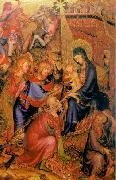
Öl auf dem Segeltuch,das echte Aroma von alten Meistern
|
unknow artist
|
|||
|
|
|||

|
|||
The Adoration of the Magi
Gemälde IDENTIFIZIERUNG:: 63959 new21/unknow artist-527743.jpg 1380-90 Tempera on wood, 50 X 31 cm Museo Nazionale del Bargello, Florence The left-hand panel of this diptych depicts the adoration of the Infant Jesus by the Magi; the right-hand panel represents the Crucifixion. This is another of the pictures whose origin has been the subject of considerable speculation among scholars, for the international uniformity which is the hallmark of the International Gothic style has led to the picture being ascribed to Avignon, Paris, Franco-Flemish, Austrian and Bohemian artists. Perhaps the closest analogy can be found in the works of the Master of Trebon (the folds of the Virgin's mantle, undulating in a similar manner, or the insubstantial birds on the roof of the Bethlehem stable). On the other hand, these details could be coincidental, or derived from a common source; until the coat of arms on the ornate bed can be positively identified these questions will remain open to speculation. Seated on her canopied bed, the Virgin receives the homage of the Magi, who are taking off their crowns. In the upper left corner we can see the Magi and their horses assembling from different directions. In the bottom right corner Joseph is sitting; when the guests arrived he was warming his feet at a brazier. Now, like the Magi, he, too, takes off his headgear with a humble gesture. (If we want to find the prototype of the figure, we could see it in the representations of the month of February in calendars of books of hours: the figure of an elderly man warming himself at the fire was the personification of February.) The picture is a strange mixture of marked condensation and of anecdotal details. The story is circumstantially told by merely putting the most important characters and decor side by side. The wealth of small objects set beside one another gradually overlap and cover the whole surface of the picture. The Virgin's canopied bed is a throne too, while its top has a double role and is also the roof of the Bethlehem building crowded with dovecotes. The space left empty by the structure of the bed-throne is filled up by a bastion. Space, as a substance, is not conveyed; the motifs are linked with one another in the way the words of a sentence are. The star, for example, is given emphasis by the small spot of nocturnal darkness surrounding it and separating it from the golden background. , Artist: UNKNOWN MASTER, French , The Adoration of the Magi (Bargello Diptych) , 1351-1400 , French , painting , religious Siehe Galerie in Schweden |
|||
|
|
|||
|
|
|||
| 1380-90 Tempera on wood, 50 X 31 cm Museo Nazionale del Bargello, Florence The left-hand panel of this diptych depicts the adoration of the Infant Jesus by the Magi; the right-hand panel represents the Crucifixion. This is another of the pictures whose origin has been the subject of considerable speculation among scholars, for the international uniformity which is the hallmark of the International Gothic style has led to the picture being ascribed to Avignon, Paris, Franco-Flemish, Austrian and Bohemian artists. Perhaps the closest analogy can be found in the works of the Master of Trebon (the folds of the Virgin's mantle, undulating in a similar manner, or the insubstantial birds on the roof of the Bethlehem stable). On the other hand, these details could be coincidental, or derived from a common source; until the coat of arms on the ornate bed can be positively identified these questions will remain open to speculation. Seated on her canopied bed, the Virgin receives the homage of the Magi, who are taking off their crowns. In the upper left corner we can see the Magi and their horses assembling from different directions. In the bottom right corner Joseph is sitting; when the guests arrived he was warming his feet at a brazier. Now, like the Magi, he, too, takes off his headgear with a humble gesture. (If we want to find the prototype of the figure, we could see it in the representations of the month of February in calendars of books of hours: the figure of an elderly man warming himself at the fire was the personification of February.) The picture is a strange mixture of marked condensation and of anecdotal details. The story is circumstantially told by merely putting the most important characters and decor side by side. The wealth of small objects set beside one another gradually overlap and cover the whole surface of the picture. The Virgin's canopied bed is a throne too, while its top has a double role and is also the roof of the Bethlehem building crowded with dovecotes. The space left empty by the structure of the bed-throne is filled up by a bastion. Space, as a substance, is not conveyed; the motifs are linked with one another in the way the words of a sentence are. The star, for example, is given emphasis by the small spot of nocturnal darkness surrounding it and separating it from the golden background. , Artist: UNKNOWN MASTER, French , The Adoration of the Magi (Bargello Diptych) , 1351-1400 , French , painting , religious | |||
|
|
|||







